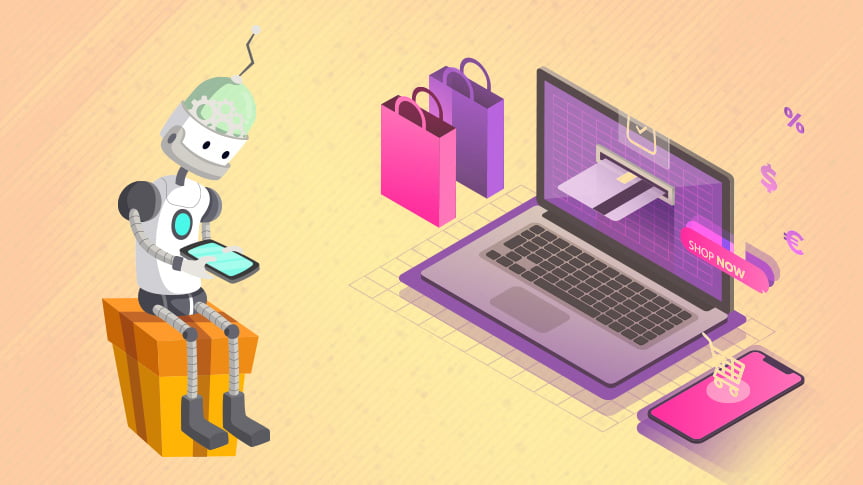
Considering the way Artificial Intelligence is influencing the IT industry, the day is not far when we will receive our delivery packages by robots. Artificial Intelligence (AI) is delivering commendable results in the field of automation. Right from Siri to self-driven cars, AI has helped not only to cut down the mundane manual processes but also has redefined these tasks in a more engaging, attractive, and innovative way. As per Markets and Markets Research, the AI market is expected to reach $190 billion by 2025.
Needless to say, most of the companies will compete in this race to stand first. Therefore, consumers are sure to witness technology innovation in the form of diverse products/services. Talking about products and services, AI Robots are already attracting a lot of attention from potential creators, investors, and buyers. An Accenture report says, “By 2035, AI will generate $14 trillion of additional revenue and increase profitability by up to 38%.”
The e-commerce industry is expected to receive a big profitability boost through AI Delivery Robots. Not just the E-Commerce industries, but Retail and Food & Beverages are also gearing up to join the bandwagon. Robots take care of the manual tasks that could be easily automated, which will leave more time at hand for humans to engage more in other complex tasks that require a higher human touch and intelligence like customer service and product sales and marketing instead of indulging in other laborious tasks. More the time dedicated to helping customers and focusing on the product, the higher will be the revenues.
All industry giants – Ford, Amazon, FedEx, and Walmart are working on their own prototype model to create human-looking robots, who are capable of walking on their two feet to deliver packages and manage the mundane manual tasks.
Industry 4.0
Since Industry 4.0 came into the picture, SMEs, as well as big companies, have made tangible improvements in safety, performance, profitability, and efficiency. It involves the automation of critical processes in advanced areas like cyber systems, cloud computing, and data analytics. However, every industrial revolution has its own set of pros and cons. So is the case with Industry 4.0, which involves Artificial Intelligence. One of the biggest challenges that cannot be ignored is the workforce that is required to manage this technology.
As much as the idea of robots helping companies sounds fantastic, creating a strong mastermind workforce to execute it is no child’s play. Companies can surely manage their day-to-day activities and consumers may have these robots over as guests whenever they place an order for food / any product, but if they are not guided properly, their functioning will become miserable. This is where organizations need to understand that it is extremely important, they come up with robust strategies like knowledge transfer, inventory management, and creating transparent systems and processes.
ERP plays a dynamic role here. Various components of an ERP system like, account receivables, product and inventory, shipment statuses, and vendor management helps employees obtain required information through a single platform. ERP accumulates information related to various company aspects into a large database and combines several processes like accounting, website, CRM, supply chain, HR, and marketing into a single entity. The major reasons companies adopt an ERP system are benefits like automation, cost-saving, increased efficiency, and workforce allocation on multiple tasks.
The Most Important ERP Modules
- Business Intelligence: Organizations plan their growth plan depending upon the past reports. ERP software, when integrated with business intelligence tools, will deliver detailed insights.
- Inventory: Advanced inventory management modules in smart ERP systems track and predict where the purchasing department should focus.
- Accounting: With automated account receivables, paper-based invoices can be replaced with e-invoicing for cost-cutting.
- Manufacturing: Data-driven planning helps in inventory optimization, lean manufacturing, and predictive analysis. This enhances the quality assurance process while keeping down the operational costs.
- Automation: A unified dashboard allows automate multiple tasks like the management of inventories, supply chain, employees, and many more.
In the E-Commerce industry, inventory management plays a crucial role. If the products are not stocked properly, offering customer service would become an issue. Labor management is another tedious task that requires rigorous training sessions. And yet, there is no security of labor commitment for a long time. To avoid all these problems, companies opt for e-commerce ERP solutions.
How does AI Delivery Robots work?
The recent example of such a simulation is Amazon’s delivery bot- Scout. Scout VP Sean Scott mentioned that under simulation, Amazon bot can perform thousands of deliveries overnight while talking to The Verge.
To accelerate the development, a comprehensive virtual mapping of American suburbs is created, which is collected in the form of action modeling, real-life textures, and 3D data. The attractive feature here is that the robot is completely unaware of it undergoing simulation and therefore, it behaves like in the real world. The bots will be computed with geo locations and certain call commands that will trigger its navigation to the destination.
A lot of food companies are also experimenting with this concept for shuttling food to reduce higher operational costs and door-to-door delivery problems. According to the Wall Street Journal’s publishing, few such tests are being performed in Miami, Michigan, and Las Vegas.
Soon we can expect the scene of the sidewalks being shared by bots leveraging companies to save thousands of dollars through this delivery technology. This technology will not only aim at clearing up the traffic but also but cutting down the delivery costs.
AI integration with ERP
As discussed before, all of this needs a robust strategy that is accountable for inventory management, highly skilled resource planning and scheduling timely deliveries. A modern generation ERP solution helps businesses sail smoothly through technology upscaling. ERP’s predictive diagnostic feature when combined with AI, results in reduced process runtime and better resource management.
Conclusion
Although most of the companies are testing the AI waters through bots, skilled human intervention is required to maintain the dignity of this upcoming innovation. AI Robots will help the E-Commerce industry reduce operating costs and increase the profit margins by almost 40% through this delivery technology. These robots will be capable of navigating through maps and perform door-to-door deliveries just like humans to adding up to reduced traffic, organized communication and exclusive customer service.
Related Articles





Leave a Reply